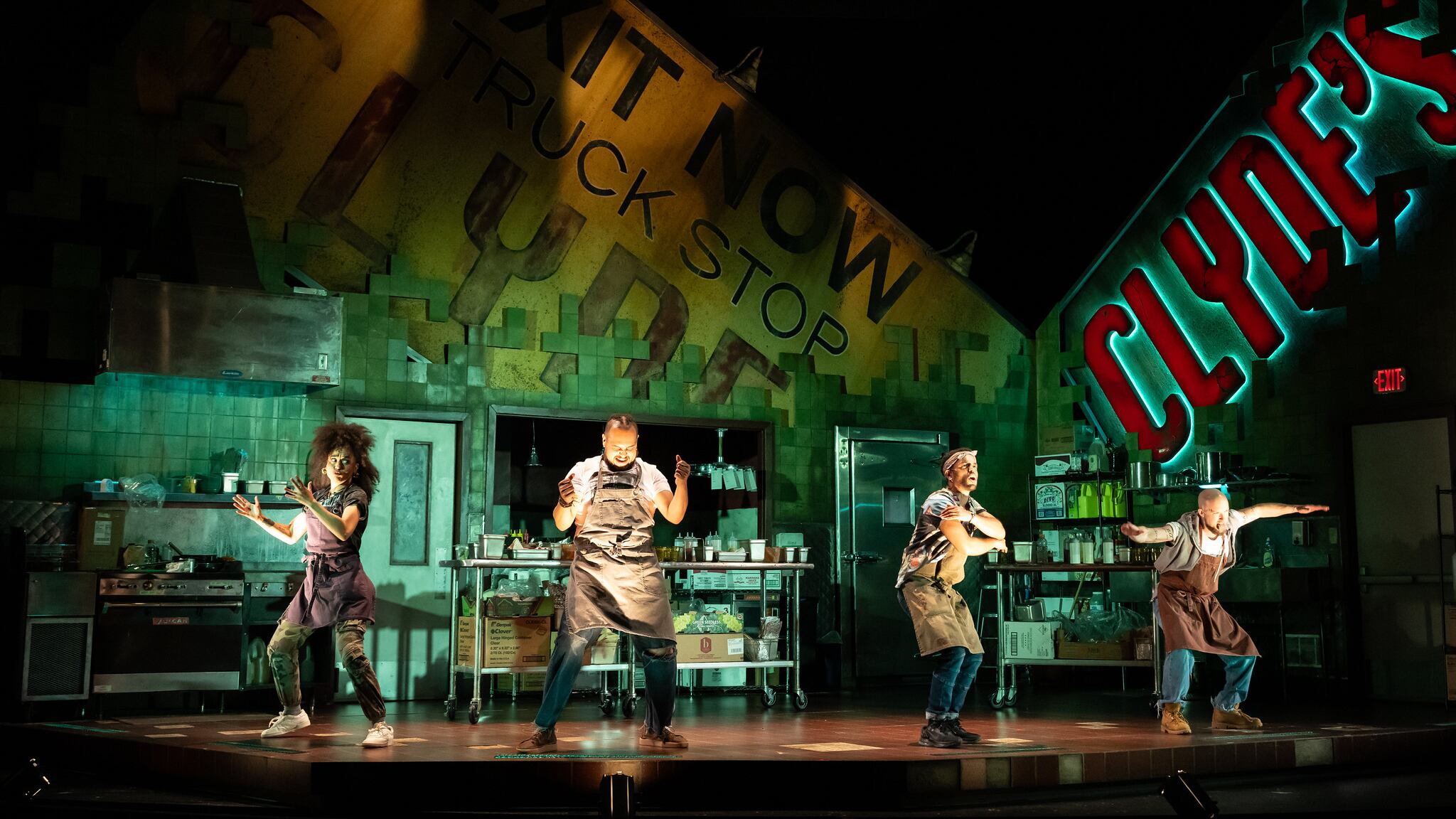Two quick notes about the Portland Center Stage comedy Clyde’s: It’s not about the steakhouse on Northeast Sandy Boulevard, and Andrea Vernae is a genius as the titular owner of a dingy truckstop diner.
Vernae is Clyde, a worthy villain who would rather be feared than loved, who squashes her ex-con employees under her thumb as a foil to their budding optimism. Her fashions, from the 2004 It Girl denim ensemble to a devilish red pleather dominatrix look, are as sickening as the rage she releases to bully her employees into submission.
Clyde was broken a long time ago by the penal system, or a lifetime of domestic violence. Her backstory isn’t fully explored, but it holds enough in common with millions of Americans with criminal records. The rest of the cast is Clyde’s staff, sympathetic former prisoners trying to rebuild their lives, like single mom Letitia (Lauren “Lo” Steele), recovering addict Rafael (Pascal Arquimedes), and newcomer Jason (Orion Bradshaw), whose face is mangled by racist prison tattoos. De facto leader of the restaurant is cook Montrellous (Setareki Wainiqolo) who keeps the peace by inspiring his co-workers to dream up their perfect sandwich with any range of artisan ingredients.
A co-production with Syracuse Stage, Clyde’s was written by playwright Lynn Nottage, whose writing has won her two Pulitzer Prizes. Clyde’s begins in the late 2000s, indicated with sound snippets from former presidents George W. Bush and Barack Obama, and mixtape-era Nicki Minaj. It carries into the early foodie era of the 2010s, as fresh artisan ingredients became more popular, without referencing Instagram photos of food.
Clyde’s serves balanced scoops of hopeful optimism and harsh realism about life on the outside. Prison can break people in ways we don’t prepare ourselves to handle, whether that looks like balancing child care and health care with parole requirements; a lingering resentment of authority; or the anxiety of freedom after time served in a restricted environment. Letitia recognizes how deeply broken Clyde is as she torments the staff, reminding her co-workers that Clyde’s behavior would barely be remarkable if she were a man.
Clyde’s is a workplace ensemble comedy about a dysfunctional last-resort job. Montrellous’ soothing tenor voice carries him as the kitchen leader with a mysterious past. Rafael and Letitia’s budding romance is cute with believable chemistry, and Jason manages to make the audience feel sympathy for a white guy with little-man rage as he’s hazed by his co-workers of color for his racist face tattoos.
Two mysteries get solved during Clyde’s runtime: why Montrellous went to prison and why Clyde is so hellbent on curbing her staff’s ambitions. A third, lesser mystery around a 15-pound bag of rancid fish turns out to be more of a red herring than Chekhov’s Chilean sea bass. But as the play takes a metaphoric turn during the final act, Vernae’s Clyde reminds us that not all cages have iron bars.
Clyde has stayed hard and kept it real her whole life. Food is nothing to her but a means to an end. It doesn’t hold the magic power of community building that Montrellous wants her to taste. Clyde finds out what happens when keeping it real goes wrong, but it’s no poetic justice. She reminds us that even when we want people to see the light, they can’t or won’t, and not even love is strong enough to save them.
How does Vernae get the audience to root for Clyde, to stand and applaud her the loudest even after terrorizing the rest of the cast? That’s just her special sauce.
SEE IT: Clyde’s plays at Portland Center Stage, 128 NW 11th Ave., 503-445-3700, pcs.org. 7:30 pm Wednesday–Sunday, 2 pm Saturday, Sunday and select Thursdays, through June 30. $25–$86.
